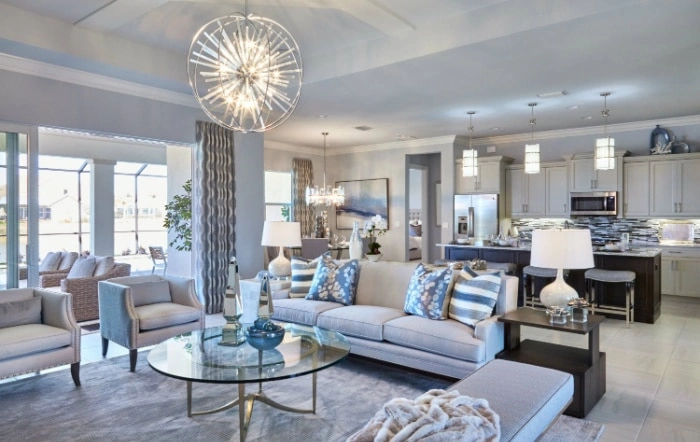Your home can look expensive without spending a fortune. Smart design choices make all the difference. These proven tips will transform your space on any budget. For more home improvement inspiration and detailed guides, visit Floarena for expert advice.
What Makes Homes Look Expensive
Expensive homes share common features. Understanding these helps you recreate the look. Focus on quality over quantity. Clean lines matter more than expensive items.
Key elements include:
- Clean, organized spaces
- Good lighting design
- Quality materials
- Neutral color schemes
- Attention to details
- Consistent style throughout
Color Choices That Add Luxury
Use Neutral Colors as Your Base
Neutral colors create timeless elegance. They make rooms feel larger and brighter. Ways to make your home look more expensive start with smart color choices.
Best neutral options:
- Crisp white walls
- Warm gray tones
- Soft beige shades
- Classic cream colors
- Light greige combinations
Add Bold Accents Carefully
Bold colors work best as accents. Use them sparingly for maximum impact. Choose rich, deep tones over bright colors.
Premium accent colors:
- Deep navy blue
- Forest green
- Rich burgundy
- Charcoal gray
- Classic black
Lighting Upgrades That Transform Spaces
Layer Different Types of Lighting
Good lighting is essential for luxury appeal. Mix different light sources in each room. This creates depth and warmth.
Essential lighting layers:
- Overhead ambient lighting
- Task lighting for activities
- Accent lights for artwork
- Decorative statement fixtures
Replace Outdated Light Fixtures
Old fixtures date your home instantly. New lighting creates immediate impact. Choose fixtures that match your style.
High-impact lighting upgrades:
- Statement chandeliers
- Modern pendant lights
- Elegant wall sconces
- Designer table lamps
- Under-cabinet LED strips
Control Your Lighting
Dimmer switches add flexibility. They create different moods throughout the day. Install them in every room possible.
Lighting control tips:
- Add dimmer switches everywhere
- Use warm LED bulbs
- Hide light sources when possible
- Install LED strip lighting
Add Architectural Details
Install Crown Molding and Trim
Crown molding adds instant elegance. It makes ceilings appear higher. This is one of the best ways to make your home look more expensive.
Trim options to consider:
- Crown molding on ceilings
- Chair rails in dining rooms
- Taller baseboards
- Decorative door casings
- Window trim upgrades
Create Interest with Wall Treatments
Wall treatments add texture and depth. They create focal points in rooms. Choose treatments that match your style.
Popular wall treatment ideas:
- Wainscoting in bathrooms
- Board and batten accents
- Textured wallpaper
- Built-in shelving
- Stone accent walls
Flooring That Looks Premium
Choose Hard Surface Floors
Hard surfaces look more expensive than carpet. They’re easier to maintain long-term. Pick materials that suit your budget and style.
Best flooring options:
- Hardwood planks
- Luxury vinyl plank
- Natural stone tiles
- Large ceramic tiles
- Polished concrete
Use Area Rugs Strategically
Rugs add warmth and define spaces. Choose the right size for each room. Quality matters more than quantity.
Rug selection tips:
- Layer rugs for texture
- Choose appropriate sizes
- Invest in natural materials
- Match colors to your scheme
Window Treatments That Impress
Hang Curtains Properly
Curtain placement affects room proportions. Hang them high and wide. This makes windows look larger.
Curtain hanging rules:
- Mount rods near the ceiling
- Extend rods past window frames
- Choose full-length panels
- Use quality fabrics
- Add motorized options
Layer Window Treatments
Layering adds depth and function. Combine different treatments for best results. This approach looks custom and expensive.
Layering combinations:
- Blinds with curtains
- Sheers with panels
- Valances with shades
- Roman shades with drapes
Smart Furniture Choices
Invest in Key Pieces
You don’t need new everything. Focus on statement pieces that matter most. These anchor your room’s design.
Priority furniture pieces:
- Quality sofa or sectional
- Solid dining table
- Upholstered headboard
- Built-in storage
- Vintage accent pieces
Arrange Furniture Thoughtfully
Good arrangement costs nothing. It makes rooms feel larger and more functional. Create conversation areas with your layout.
Arrangement principles:
- Create conversation groups
- Leave walking space
- Define areas with furniture
- Mix heights and shapes
- Use rugs to anchor spaces
Accessories That Add Style
Style Surfaces Carefully
Accessories complete your room’s look. Less is often more with styling. Choose pieces that serve a purpose.
Essential accessories:
- Fresh flowers and plants
- Quality throw pillows
- Framed artwork
- Decorative objects
- Coffee table books
Create Attractive Displays
Group items in odd numbers. Vary heights for visual interest. Edit regularly to avoid clutter.
Display tips:
- Group by color or material
- Use different heights
- Include personal items
- Change displays seasonally
- Keep it minimal
Kitchen Updates That Pay Off
Refresh Cabinets Affordably
New cabinets cost thousands. Refreshing existing ones costs hundreds. Paint and hardware make huge differences.
Cabinet refresh options:
- Paint existing cabinets
- Update all hardware
- Add crown molding
- Install new doors
- Refinish wood surfaces
Add High-Impact Elements
Small changes create big results in kitchens. Focus on elements people notice first. These ways to make your home look more expensive deliver maximum impact.
High-impact kitchen updates:
- Tile backsplash installation
- Under-cabinet lighting
- New countertops
- Updated faucet
- Fresh paint colors
Bathroom Luxury Touches
Update Fixtures and Hardware
Bathroom fixtures date quickly. New ones instantly modernize the space. Choose finishes that coordinate throughout.
Bathroom fixture updates:
- Modern faucets
- Rainfall showerheads
- Contemporary towel bars
- Vessel sinks
- Heated towel racks
Add Spa-Like Elements
Create a spa feeling at home. Small touches make big differences. Focus on comfort and luxury.
Spa-inspired additions:
- Heated floors
- Natural materials
- Soft lighting
- Quality towels
- Essential oil diffusers
Smart Home Technology
Add Modern Conveniences
Technology makes homes feel current. Start with simple upgrades. Add more advanced features over time.
Basic smart home features:
- Smart thermostats
- Automated lighting
- Security systems
- Whole-house audio
- Built-in charging stations
Hide Technology Clutter
Visible wires look messy. Cord management systems help. Built-in solutions work best.
Technology organization:
- Cord management systems
- Built-in charging drawers
- Hidden speakers
- Motorized window treatments
Outdoor Space Improvements
Enhance Curb Appeal
First impressions matter most. Your front entrance sets expectations. Small improvements make big differences.
Curb appeal upgrades:
- Paint the front door
- Update house numbers
- Add landscape lighting
- Plant mature shrubs
- Install quality hardware
Create Outdoor Living Areas
Outdoor spaces extend your home. They add perceived square footage. Make them comfortable and inviting.
Outdoor living improvements:
- Quality outdoor furniture
- String lights or lanterns
- Fire pit or fireplace
- Outdoor kitchen elements
- Privacy screens
Keep Everything Clean and Organized
Maintain High Standards
Cleanliness costs nothing. It makes everything look more expensive. Develop regular cleaning routines.
Maintenance priorities:
- Deep clean regularly
- Touch up paint promptly
- Keep surfaces clear
- Organize storage areas
- Maintain outdoor spaces
Declutter Ruthlessly
Less stuff looks more expensive. Clear surfaces appear cleaner. Edit your belongings regularly.
Decluttering strategies:
- Clear countertops daily
- Use hidden storage
- Rotate seasonal items
- Follow one-in-one-out rule
- Quality over quantity
Budget-Friendly Implementation
Start with High-Impact Changes
Not all improvements cost the same. Some deliver better returns. Focus on these first.
Best value improvements:
- Fresh paint throughout
- New light fixtures
- Updated hardware
- Window treatments
- Deep cleaning
DIY vs. Professional Work
Some projects suit DIY efforts. Others need professional skills. Know the difference to avoid costly mistakes.
DIY-friendly projects:
- Painting walls and trim
- Installing hardware
- Hanging artwork
- Styling accessories
- Basic organization
Professional projects:
- Electrical work
- Plumbing updates
- Major installations
- Structural changes
Planning Your Transformation
Create a Priority List
Don’t tackle everything at once. Make a plan based on impact and budget. Work through projects systematically.
Planning steps:
- Assess current condition
- Set realistic budget
- List desired changes
- Prioritize by impact
- Schedule projects
Stay Consistent Throughout
Consistency ties everything together. Choose finishes that work throughout your home. This creates flow between rooms.
Consistency elements:
- Hardware finishes
- Paint colors
- Flooring materials
- Light fixture styles
- Window treatments
Seasonal Updates
Refresh with the Seasons
Small seasonal changes keep things fresh. They don’t require major investments. Focus on textiles and accessories.
Seasonal refresh ideas:
- Change throw pillows
- Swap artwork
- Update plant displays
- Adjust lighting
- Rotate decorative objects
Annual Maintenance Tasks
Regular maintenance prevents bigger problems. Schedule tasks throughout the year. This keeps everything looking its best.
Annual maintenance checklist:
- Power wash exterior
- Service HVAC systems
- Clean gutters
- Deep clean carpets
- Trim landscaping
Measuring Your Success
Track Your Progress
Take before and after photos. This helps you see improvements. It also guides future decisions.
Progress tracking tips:
- Photograph each room
- Document changes made
- Note costs and time
- Ask for feedback
- Plan next steps
Enjoy Your Results
Ways to make your home look more expensive don’t have to break the bank. Small changes create big impacts. Focus on quality improvements over quantity.
Your home should reflect your personality. It should feel comfortable and welcoming. Most importantly, it should make you happy every day.
These strategies work for any budget or timeline. Start with one room or one project. Build success gradually over time.






